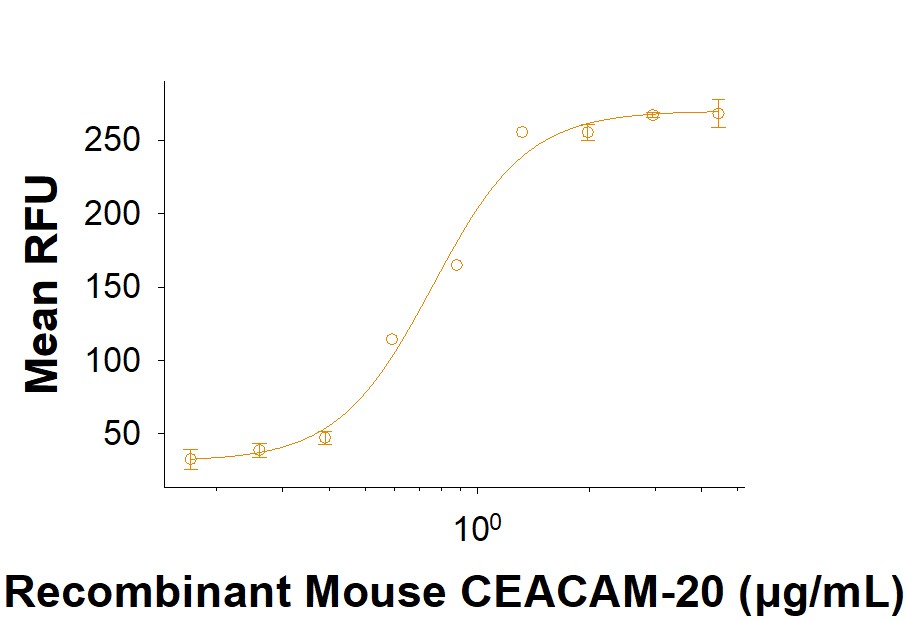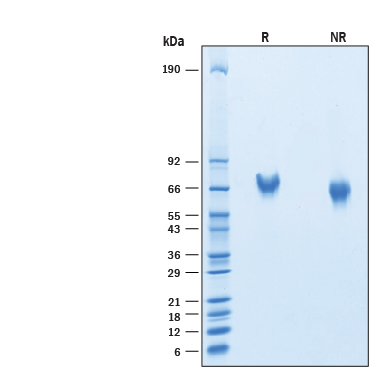Recombinant Mouse CEACAM-20 His-tag Protein, CF Summary
Product Specifications
His31-Ala430
Analysis
Product Datasheets
Carrier Free
CF stands for Carrier Free (CF). We typically add Bovine Serum Albumin (BSA) as a carrier protein to our recombinant proteins. Adding a carrier protein enhances protein stability, increases shelf-life, and allows the recombinant protein to be stored at a more dilute concentration. The carrier free version does not contain BSA.
In general, we advise purchasing the recombinant protein with BSA for use in cell or tissue culture, or as an ELISA standard. In contrast, the carrier free protein is recommended for applications, in which the presence of BSA could interfere.
10953-CM
| Formulation | Lyophilized from a 0.2 μm filtered solution in PBS. |
| Reconstitution | Reconstitute at 500 μg/mL in PBS. |
| Shipping | The product is shipped with polar packs. Upon receipt, store it immediately at the temperature recommended below. |
| Stability & Storage: | Use a manual defrost freezer and avoid repeated freeze-thaw cycles.
|
Scientific Data
 View Larger
View Larger
Immobilized Recombinant Mouse CEACAM-20 His-tag Protein (Catalog # 10953-CM) enhances L cells mouse fibroblast cell line adhesion. The ED50 for this effect is 0.300‑1.50 μg/mL.
 View Larger
View Larger
2 μg/lane of Recombinant Mouse CEACAM-20 His-tag Protein (Catalog # 10953-CM) was resolved with SDS-PAGE under reducing (R) and non-reducing (NR) conditions and visualized by Coomassie® Blue staining, showing bands at 63-73 kDa.
Reconstitution Calculator
Background: CEACAM-20
Carcinoembryonic antigen-related cell adhesion molecule-20 (CEACAM-20) is a member of the CEACAM subfamily of glycoproteins in the immunoglobulin (Ig) superfamily primarily found in mammals. Mature mouse CEACAM-20 consists of an extracellular domain (ECD) with a truncated IgV-like N domain, unique among CEACAMs, and four IgC2-like domains, a transmembrane domain, and a cytoplasmic domain (1-5). The cytoplasmic domain is unusually long compared to most other CEACAMs and is predicted to contain four tyrosine phosphorylation sites, two of which correspond to the immune-receptor tyrosine-based activation motif (ITAM) (2, 3). The ECD of mouse CEACAM-20 shares 59% and 82% amino acid sequence identity to human and rat CEACAM-20, respectively. CEACAM proteins, along with the closely related pregnancy-specific glycoproteins (PSGs), have been linked to numerous intercellular-adhesion and intracellular signaling processes including cell adhesion, growth, and recognition, differentiation, angiogenesis, apoptosis as well as pathogen transmission, tumorigenesis, and fetal–maternal interactions (5, 7, 8). CEACAM-20 expression is limited to the reproductive system and the intestinal tract, with the highest levels of expression found in the small intestine and prostate (2, 3). An in vitro model of human prostate morphogenesis showed that CEACAM-20 is co-expressed with CEACAM-1 and plays a critical role in the formation of prostate organoids, making it a marker for prostate cancer (2). Although the exact mechanism is not fully understood, CEACAM-20 may promote the proliferation of intestinal epithelial cells (IECs) (9). There is evidence suggesting CEACAM-20 can induce the production of chemokines like interleukin (IL)-8 and stimulate inflammatory responses in colitis and Crohn's disease (6). CEACAM-20 is also thought be act as a physiological substrate for SAP-1 in the intestinal epithelium (10).
- Tchoupa, A. et al. (2014) J Cell Commun Signal 12:27.
- Zhang, H. et al. (2013) PLoS ONE 8:e53359.
- Zebhauser, R. et al. (2005) Genomics 86:566.
- Beauchemin, N. Arabzadeh, A. (2013) Cancer Metastasis Rev 32(3):643.
- Kuespert, K. et al. (2006) Curr Opin Cell Biol 18:565.
- Murata, Y. et al. (2015) PNAS E4264-4271.
- Chang, C.L. et al. (2013) PLoS One. 8:e61701.
- Horst, A.K. and Wagener, C. (2004) Handb Exp Pharmacol 283-341.
- Kitamura, Y. et al. (2015) Genes to Cells 20:578.
- Kotani, et al. (2016) Expert Review of Gastroenterology & Hepatology. 10:1313.
FAQs
No product specific FAQs exist for this product, however you may
View all Proteins and Enzyme FAQsReviews for Recombinant Mouse CEACAM-20 His-tag Protein, CF
There are currently no reviews for this product. Be the first to review Recombinant Mouse CEACAM-20 His-tag Protein, CF and earn rewards!
Have you used Recombinant Mouse CEACAM-20 His-tag Protein, CF?
Submit a review and receive an Amazon gift card.
$25/€18/£15/$25CAN/¥75 Yuan/¥1250 Yen for a review with an image
$10/€7/£6/$10 CAD/¥70 Yuan/¥1110 Yen for a review without an image
